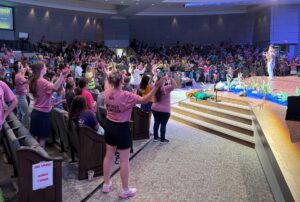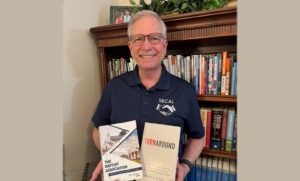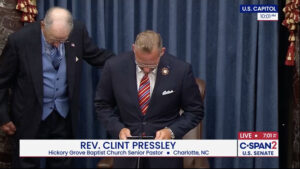
BLUEFIELD, Va. (BP)–On June 8, 1944, Private William A. Stevens Jr. landed on a beach in Normandy, France, along with another 200 soldiers from the United States Army’s Ninth Infantry Division. Bill Stevens was just 19 years old and he and his young comrades had been charged with capturing a coastal town in support of the Allied “D-Day” operation against the Germans, which had begun just two days before.
“It was something,” Stevens says, recalling the day they stormed the beaches of Normandy. “We landed in water up to our knees and bodies were floating around everywhere. It was confusing, a mess, everybody running and screaming. Only after about three or four engagements did we even begin to realize what we were doing and what was going on.”
Only 60 of those 200 soldiers would survive that day but that was typical. Allied casualties from the operation at Normandy totaled more than 10,000. While the tide of the war eventually turned in their favor, the men were forever changed.
“The only thing you thought about was surviving and looking out for each other,” Stevens says now. And, on more than one occasion, he nearly didn’t survive. In fact, Stevens can tell stories of many close calls — of his backpack being shot all to pieces, a bullet knocking his rifle out of his hands and shrapnel cutting his bed roll off his back.
“One time, three of us were standing in a street talking when a burp gun cut loose at us,” Stevens says. “I was in the middle and the two GIs on both sides of me dropped to the ground. They were killed and I didn’t even get a scratch.”
Stevens tells of another occasion when his squad had the Germans on the run.
“We went into the woods and I looked up and saw a German soldier right in front of me, no more than 25 feet ahead,” he recalls. “I could see the color of his eyes. We both threw up our rifles at the same time, but something inside me said, ‘Don’t shoot.’ I held my hand up and told him, ‘We are American soldiers. Come out with your hands up and we will give you something to eat.’ He threw down his gun and surrendered, and my squad went back with eight prisoners.”
Stevens admits that during the war he was at times angry, frightened and frustrated, asking himself, “Why am I here?” But, he says, “I knew the answer: to help those who couldn’t help themselves and to further world peace.”
What sustained him in the midst of all the death and destruction?
“My mother and my father. I knew they were praying for me,” he says. “My mother gave me a metal-covered Bible to carry in my shirt pocket, which gave me much comfort.”
Stevens was promoted to sergeant and then made squad leader during his nearly two months in Normandy, but his combat service came to an end on July 26, when the close calls finally caught up with him.
“We were moving back through the German lines and got pinned down,” Stevens recalls. “I started to raise up from a kneeling position, but got knocked flat by a machine gun — two in my left thigh and four in my left ankle.”
He spent the next five months hospitalized in England where, through five surgeries, doctors managed to save his leg. When the Germans surrendered in May 1945, Stevens came home with a Purple Heart.
Back home in Lovingston, Va., Stevens began to wonder what he would do next As a young teenager, he had worked lots of odd jobs, trying to better himself, but earned as little as a dollar a day.
“When I was 18, I didn’t know what my life would be,” Stevens says. “I wanted a better life, but my family couldn’t afford to send me to college. I couldn’t see daylight. I had ambition to make things better, but I didn’t know what to do to make it better.”
Through an aunt in Rich Creek, Va., Stevens learned about Bluefield College, a small Christian school in southwest Virginia. Through his mother, he learned about the GI Bill, a government program that helped veterans get more education.
“I served my country and would again, and now they were prepared to serve me,” Stevens says. “I gratefully accepted what they wanted to do for me.”
But while God had already brought him through insurmountable odds, Stevens wasn’t at all prepared for college. His body trembled uncontrollably — a symptom of post-traumatic stress disorder, although he didn’t know it at the time.
“I didn’t know what was wrong with me,” Stevens said. “We [combat veterans] were all in the same boat. We didn’t know how things would go from one day to the next and we didn’t know if we could study or not.”
But Bluefield College faculty and staff — people like James McCoy, Velma Jackson and E.M. Louthan — overlooked the veterans’ limitations and provided them with love and care.
“They just wrapped their arms and hearts around us GIs and gave us what we needed — a lot of patience and love,” Stevens says. “We didn’t know if we were in shape to study. We could easily have been defeated, but Bluefield College made all the difference.
“I would not have made it through college without the individual help I received from Bluefield College,” Stevens adds. “The college took such good care of me, and I am so indebted to the school.”
After earning an associate’s degree in engineering from Bluefield College in 1948, Stevens went to earn a bachelor’s degree in business administration at the University of Tennessee and began 32-year a career with the United States Public Health Service. He worked with pediatric cardiologists, heart surgeons and the American Heart Association, researching causes of heart disease in children. While he’s grateful for a distinguished career, however, he says not a day goes by that he doesn’t think about his veteran classmates from Bluefield College — men like Earl “Arty” Shaw, Byron Hale and Harold Harmon.
“I hope they have had a life as fulfilling as mine,” Stevens says. “I still pray for them like I do for myself. I lie in bed at night and compare myself to what it used to be when I was 13 or 14 years old. As bad as I had it in World War II, it was the grace of God that opened up the door for me and opened up the door of life.”
With Betty, his wife of almost 60 years, Stevens lives in retirement at Strasburg in Virginia’s Shenandoah Valley. He says his life is complete.
“My life has come full circle,” Stevens says, “because I’m now sharing my story with the people and the college that meant so much to me when I didn’t know if I was going to make it. I cannot express my love and admiration enough for Bluefield College. They gave me my start.”
–30–
Chris Shoemaker is director of public relations for Bluefield College (bluefield.edu).














